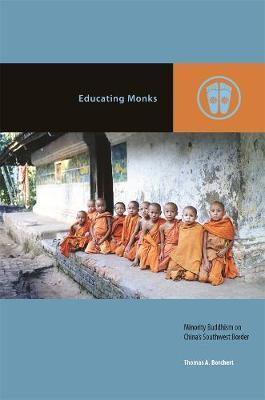Overview
Most studies of Buddhist communities tend to be limited to villages, individual temple communities, or a single national community. Buddhist monastics, however, cross a number of these different framings: They are part of local communities, are governed through national legal frameworks, and participate in both national and transnational Buddhist networks. Educating Monks makes visible the ways Buddhist communities are shaped by all of the above—collectively and often simultaneously. Educating Monks examines a minority Buddhist community in Sipsongpanna, a region located on China’s southwest border with Myanmar and Laos. Its people, the Dai-lue, are “double minorities”: They are recognized by the Chinese state as part of a minority group, and they practice Theravada Buddhism, a minority form within China, where Mahayana Buddhism is the norm. Theravada has long been the primary training ground for Dai-lue men, and since the return of Buddhism to the area in the years following Mao Zedong’s death, the Dai-lue have put many of their resources into providing monastic education for their sons. However, the author’s analysis of institutional organization within Sipsongpanna, the governance of religion there, and the movements of monks (revealing the “ethnoscapes” that the monks of Sipsongpanna participate in) points to educational contexts that depend not just on local villagers, but also resources from the local (Communist) government and aid form Chinese Mahayana monks and Theravada monks from Thailand and Myanmar. While the Dai-lue monks draw on these various resources for the development of the sangha, they do not share the same agenda and must continually engage in a careful political dance between villagers who want to revive traditional forms of Buddhism, a Chinese state that is at best indifferent to the continuation of Buddhism, and transnational monks that want to import their own modern forms of Buddhism into the region. Based on ethnographic fieldwork and interviews with Dai-lue monks in China, Thailand, and Singapore, this ambitious and sophisticated study will find a ready audience among students and scholars of the anthropology of Buddhism, and religion, education, and transnationalism in Southeast and East Asia.
Full Product Details
Author: Thomas A. Borchert ,
Mark Michael Rowe
Publisher: University of Hawai'i Press
Imprint: University of Hawai'i Press
Dimensions:
Width: 15.20cm
, Height: 2.30cm
, Length: 22.90cm
Weight: 0.448kg
ISBN: 9780824866488
ISBN 10: 0824866487
Pages: 272
Publication Date: 30 May 2017
Audience:
Professional and scholarly
,
Professional & Vocational
Format: Hardback
Publisher's Status: Active
Availability: Available To Order

We have confirmation that this item is in stock with the supplier. It will be ordered in for you and dispatched immediately.
Reviews
For some time now, Thomas Borchert's sophisticated perspective on Buddhism has been working its way into the province of Buddhist studies through his papers. His long-awaited book--Educating Monks: Minority Buddhism on China's South- west Border--brings to light the ethnographic background on which he has built this perspective. . . . With his agility in crossing through the various strata of Theravada social life, Borchert reminds us that Theravadin formations everywhere involve a much more complex set up than the local/universal binary.-- Journal of Burma Studies Educating Monks is an important book. Solidly grounded in empirical research, it presents us with a unique ethnography of the lives of ethnic minority monks and novices living in a less well-known corner of China and practicing a minority form of Buddhism. At the same time, it provides a convincing analysis of one way of being a Buddhist in the modern world by showing how such an existence is both anchored in the local as well as it is linked up in multiple different ways with translocal networks. . . . This book is highly recommended to students, researchers, and general readers with an interest in local minority cultures in China and Southeast Asia, in modern Theravada Buddhism, as well as in Buddhism in general.-- Pacific Affairs
Educating Monks is an important book. Solidly grounded in empirical research, it presents us with a unique ethnography of the lives of ethnic minority monks and novices living in a less well-known corner of China and practicing a minority form of Buddhism. At the same time, it provides a convincing analysis of one way of being a Buddhist in the modern world by showing how such an existence is both anchored in the local as well as it is linked up in multiple different ways with translocal networks. . . . This book is highly recommended to students, researchers, and general readers with an interest in local minority cultures in China and Southeast Asia, in modern Theravada Buddhism, as well as in Buddhism in general.-- Pacific Affairs For some time now, Thomas Borchert's sophisticated perspective on Buddhism has been working its way into the province of Buddhist studies through his papers. His long-awaited book--Educating Monks: Minority Buddhism on China's South- west Border--brings to light the ethnographic background on which he has built this perspective. . . . With his agility in crossing through the various strata of Theravada social life, Borchert reminds us that Theravadin formations everywhere involve a much more complex set up than the local/universal binary.-- Journal of Burma Studies
Author Information
Thomas A. Borchert is associate professor of religion at the University of Vermont. Mark Michael Rowe is associate professor in the Department of Religious Studies, McMaster University.




